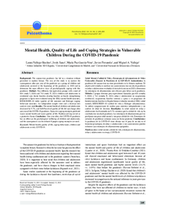This page contains documents and other resources related to children's care in the Americas. Browse resources by region, country, or category.
Displaying 301 - 310 of 3191
The Task Force on Foster Care of the Transforming Children's Care Global Collaborative Platform held the second spotlight webinar series on identifying foster carers on 5 May 2022.
Inside a cavernous stone fortress in downtown Pittsburgh, attorney Robin Frank defends parents at one of their lowest points—when they risk losing their children. The job is never easy, but in the past she knew what she was up against when squaring off against child protective services in family court. Now, she worries she’s fighting something she can’t see: an opaque algorithm whose statistical calculations help social workers decide which families should be investigated in the first place.
Just over the zigzag pathway of the Tijuana border crossing, a mile or so from the taco and churros stands that feed locals and tourists alike, past the indigenous women sitting on the sun-scorched sidewalk and begging for change with infants at their breasts, rests a pop-up encampment for Ukrainian and Russian refugees fleeing an invasion they could neither endure nor support.
Saskatchewan's advocate for children and youth released her 2021 annual report this week, highlighting the continued pressure of the COVID-19 pandemic on kids' mental health.
In the last two years, Canada and several U.S. states have begun to recognize their histories with Native American boarding schools, institutions that set out to “assimilate” Native American children into westernized U.S. ways of life by stripping them of Indigenous tradition and culture.
A new set of Alaska court rules will give youths in foster care more opportunities to have a lawyer represent what they want to happen with their cases — and their lives.
NEW ORLEANS — A federal judge on Wednesday ordered a two-week halt in the phasing out of pandemic-related restrictions on seeking asylum and raised doubts about the Biden administration’s plan to fully lift those restrictions on May 23.
A major shift in the delivery of foster care could result in hundreds of children repatriated to their Manitoba communities as more Indigenous governments are expected to take jurisdiction over child welfare from the province.
A new set of Alaska court rules will give youths in foster care more opportunities to have a lawyer represent what they want to happen with their cases — and their lives.
The aim of this study is to analyse the consequences after one year of the pandemic on a group of children and adolescents assessed at the beginning of the pandemic in 2020 and to determine the most effective ways of psychologically coping with this pandemic.


